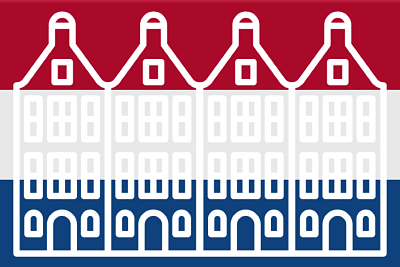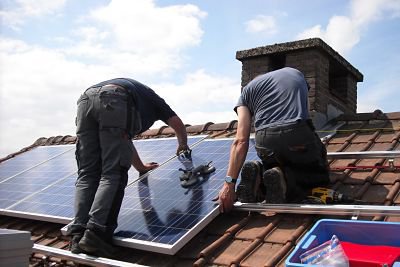If you want to buy a house in the Netherlands, refinance or increase your mortgage, you'll have to choose a new mortgage interest rate. There are fixed rate loans and variable or adjustable mortgage rates. It's important to understand the differences between those types of rates if you're thinking about getting a (new) mortgage. A good mortgage rate can help you save money and give you peace of mind. What are the pros and cons of fixed and variable mortgage interest rates?

Fixed vs. variable mortgage interest rates
The mortgage interest rate you choose has a major impact on your monthly payments. How much mortgage interest you pay depends, among other things, on the amount of your debt and the interest rate type. You can choose between variable mortgage interest and various fixed mortgage interest terms.
Fixed mortgage interest
Most people opt for a fixed mortgage rate. With a fixed rate you pay the same mortgage interest as long as your fixed period lasts. With a fixed mortgage interest you know in advance how high your monthly costs are. You can choose between fixed periods of 1 and 30 years. The most popular fixed interest periods are 10-year fixed mortgage rates, 20-year fixed mortgage rates and 30-year fixed mortgage rates.
Higher interest rate
However, the certainty about your monthly payment a fixed-interest period provides, comes with a price tag. Fixed mortgage interest is higher than variable mortgage interest. The longer your fixed-rate period, the higher your mortgage interest.
Variable mortgage interest rate
When you opt for a variable mortgage interest rate, the interest rate can differ every month or every quarter. Your mortgage interest is linked to the market interest rate. That is the Euribor rate, the interest rate at which European banks lend each other money. If the market interest rate rises, your interest rate rises as well. If the market interest rate falls, you will pay less mortgage interest. You don't know in advance how much interest you'll have to pay and you'll have to be able to cushion fluctuations in your monthly mortgage costs.
Lowest interest rate
Due to these fluctuations you're at a higher risk with variable interest rate and therefore you'll get the lowest possible interest rate. If the interest rates are on the rise, your interest will as well and your monthly mortgage payments will increase.
Fixe adjustable interest rate
Did you initially choose for variable mortgage interest rate? It's always possible to change it to a fixed interest rate. For instance if you think the mortgage interest rates are at rock bottom or if you expect them to rise in the near future. You'll need a mortgage advisor to arrange a new mortgage for you. After you fixed your adjustable rate, you'll have the certainty of a fixed interest period and a constant amount for your monthly mortgage payments.
Fixed & variable mortgage interest rates: pros and cons
As you read above, both variable mortgage interest and fixed mortgage interest have pros and cons. Below you find a summary of the most important ones.
Variable interest
Pros
- Variable interest rates are lower than fixed interest rates
- If the market interest decreases, your mortgage interest and monthly payments decrease as well
- You can always fix your variable interest rate later on
Cons
- A variable interest rate doesn't give certainty about your monthly mortgage payments
- If the market interest increases, your mortgage interest and monthly payments increase as well
- You have to keep an eye on mortgage interest developments and forecasts
Fixed interest
Pros
- Certainty about your mortgage rate and monthly payments
- If the market interest rate increases it doesn't affect your mortgage payments
- You don't have to follow or stress about mortgage rate developments
Cons
- The longer your fixed rate period, the higher your interest rate
- If the market interest rate decreases, you don't benefit from this
Combine adjustable and fixed mortgage interest
Do you want the best of both worlds: security and low monthly payments? Then you can also opt for a combination of variable mortgage interest and fixed mortgage interest. For example, you can get a 10-year fixed interest rate for half of your mortgage and the other half to adjustable interest. The fixed-interest period gives you security, while your monthly costs remain low(er) due to the variable interest part. If the market interest increases, the interest you pay on the variable part will also increase, but because of the fixed-interest part, your monthly payments will remain (more) affordable.
How to choose between fixed & floating mortgage interest?
If it's better to choose a fixed rate period, a variable interest or a combination, depends on the following factors:
- Development mortgage interest rates
- Personal situation
- Financial situation
- Maximum mortgage
- Personal preference
1. Development mortgage interest rates
First of all, the development of mortgage interest rates is important. The interest has been on the rise in 2022, but what will happen in the long term is difficult to say. Unfortunately, we can't look into the future.
That is why it's more important how you think the interest rates will develop. Do you expect mortgage rates to rise in the (near) future? Then choose a fix period interest rate. If, on the other hand, you think that the interest rate will fall, it's wise to choose a variable interest rate. Keep in mind that the mortgage interest rates were at rock bottom before 2022. The current interest rates can drop again or increase further. What do you expect?
2. Personal situation
Also consider your personal situation before choosing between fixed interest and variable interest. For example, if you want to move in a few years and you're not allowed to take the mortgage with you, it would be a waste to fix your interest for a long time. After all, a longer fixed period comes will a higher interest rate. Other matters that can affect your living situation are cohabitation, family expansion, children moving out or a divorce. You never know what's going to happen, but it's good to think about the different options.
3. Financial situation
Moreover, take your financial situation into account, in particular the ratio between your mortgage debt and your income. For instance, if your mortgage debt is high compared to your income and if you don't have much savings, you might not be able to absorb a significant increase in your monthly mortgage payments. In that case, it's smart to opt for a mortgage with a (long) fixed-interest period.
On the other hand, if you have enough savings to absorb fluctuations in your mortgage payments. A variable mortgage interest rate is often cheaper in the long term than with a fixed interest rate mortgage.
4. Maximum mortgage
Moreover, if you need a maximum mortgage to buy your house in the Netherlands, you might have to choose a long fixed-interest period. Because the mortgage type affects the maximum amount you can borrow. With a 10-year fixed mortgage, your maximum mortgage is the highest. With a 10 year fixed rate, mortgage lenders use the actual interest rate to calculate your maximum mortgage. Yet if you choose an adjustable interest rate or a shorter fixed term mortgage, lenders use a higher interest rate that is set quarterly by the AFM. And with a higher interest rate, you can borrow less.
with the current interest of 10-year interest. With a variable interest rate or a short fixed-interest period, your maximum mortgage is calculated using a key interest rate that is set each quarter by the AFM. This interest is often a lot higher than the current mortgage interest. And a higher interest rate ensures that you can borrow less.
5. Personal preference
Finally, don't forget your personal preference. If you like financial security, you'll probably feel more fixed mortgage. However, if you can deal well with the uncertainty of fluctuating monthly payments and think the chance of a lower interest rate is worth a gamble? In the latter case you can opt for variable interest.
Advice about fixed vs. variable interest
Variable interest, fixed interest or a combination? It's a difficult choice, even if you take all factors into consideration. Whatever you choose, make sure you'll be able to make your monthly payments. It's wise to discuss different scenarios with your mortgage advisor. Our experienced advisors are happy to help.
Read more about mortgages


